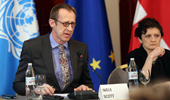
Discussing the essence of human rights as the basis for equality
By Salome Modebadze
Monday, February 17
Europe is the choice of the Georgian people, Georgian Prime Minister Irakli Gharibashvili said while presenting the National Strategy and Action Plan on Human Rights on February 13.
Promising that his team will do everything to establish European-type human rights standards in Georgia, he spoke about human rights as the foundation on which European-type statehood stands.
The Prime Minister thanked everyone engaged in the process of creating the documents. He said further adoption of the national strategy and action plan would be the initial step of the process directed at increasing independence and efficiency of democratic institutions in the country.
Expressing the loyalty of the new government towards the European values, Gharibashvili said together with the Georgian people they will succeed in placing Georgia among the European countries.
He said 2014 will be a decisive year in terms of the country approaching the European Union. Thus, PM Gharibashvili said that high standards of human rights strategy and an action plan ensuring “worthy life” to each and every citizen would play an important role in this direction.
According to the Minister of Justice Tea Tsulukiani, how the priorities of the document will be fulfilled will to a great extend define the fate of Georgia’s transformation into a modern state. She said of course that economic welfare is the number one priority of the government, but human rights are also vital, “because those countries are European, where the human rights are protected.”
Head of the United Nations in Georgia, Niels Scott, said this plan consolidates the advance and advantages taken by Georgia in human rights. Scott said the strategy and the action plan provides a clear vision about the ways to address the human rights issues.
“They also specify implementation mechanisms, including the allocation of the necessary financial resources, short-term and long-term priorities and the ways of bringing on board civil society and people through the monitoring and effective communication on human rights,” Scott said, stressing that the United Nations will support the Georgian government at every stage of the way.
“When discussing human rights we tend to think about certain very basic principles. One is equality before the law,” EU Special Adviser on Constitutional and Legal Reform and Human Rights in Georgia, Thomas Hammarberg said, stressing that everyone should have the same chance irrespective to poverty or wealth.
Hammarberg said the right to privacy and dignity should also be protected by the authorities. Women should have the same right rights as men. They should equally participate in the political decision-making in society. Freedom of expression, according to Hammarberg, is absolutely crucial for a democratic society, as well as freedom of assembly. “And of course the rights of minorities,” the EU representative said, explaining that those who are in the minority should have the protection they need in order to have a decent life in the society.
Hammarberg said all these principles are mentioned in the 1921 Georgian Constitution.
He said human rights are the subject of hard implementation and not only words. Welcoming consultations with all the ministries including the Prosecutor’s Office about what they need to do in order to contribute to the overall package to guarantee from the government to Georgian people the safety and freedom they have to have.
“Human rights are certainly very important principles, [which] deal with important matters,” Hamamrberg said, explaining that it is a sort of contract between those in power and the population at-large so that the rights for the individuals in society, which the authorities should meet, that refers to all people not some living in the country.
The preparations for developing the National Strategy and Action Plan in Human Rights were launched by the Government of Georgia last December. Consultations over the documents brought together government agencies, parliament members, civil society, international organizations and public. Public discussion on different areas of the Strategy is open at the website: www.YourHumanRights.ge.



